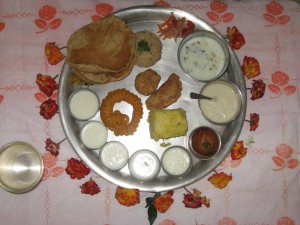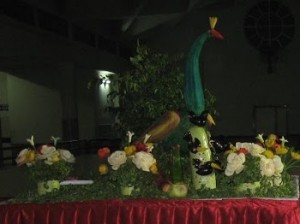India is very famous across the globe for her vibrant and colourful way of celebrating life events. One of the popular title for celebrating Indian weddings is “Big Fat Indian wedding!” There was a time an average wedding had a fixed budget and major portion of it was allocated to food on the wedding day. I remember as a child in any wedding there used to be not more than two desserts , two curries rice, special rice dish (Pulao/Biryani) raita, Dal roti and salad, papad and chutney and cool/cold drink if the wedding is in summer and of a rich family. However we have managed to develop an elephantine appetite for good food and now regardless of the affordability the peer influence has been so strong that an average budgeted Indian wedding you shall find at least two Chinese, 2
Punjabi, a few chat varieties and south Indian tiffin’s (idly dosa, Vada etc.)
apart from the regular, regional thali. Ofcourse not to miss the plateful of sweets and ice-creams.
 A rich big fat Indian wedding the menu
A rich big fat Indian wedding the menu
might be a small book of ten to twelve pages serving food from across the globe. However with changing times and trends and a more busy lifestyle we have learned to invest elaborately in pre wedding ceremonies like engagement, sangeet and mehendi ceremonies, irrespective of the regional divide. All these events are celebrated close to an average budgeted Indian wedding. I don’t see any big difference between engagement ceremonies and weddings except for number of people. The amount of fruits and vegetables used for decorations and menu list remains more or less the same as that of a wedding. At one point we blow trumpet on food inflation and soaring cost of living in cities same time we have been lavish in celebrating events at length. We have to have if not a big agency, at least an average local event management agency to organise the celebration, a caterer who can make foods from across the globe in Indian version, while he might not have even travelled out of the state he lives in, and an elaborate or should we call it a minimum of 10-15 kg of fruit and vegetable carvings used for decoration in the dinning area.
I really don’t see anything that we get out of this except for appreciating the food carving and dumping all this in a bin immediately after the event. This might sound too much, however imagine donating a ten kg bag of fruits and vegetables by the couple to less privileged people. I think we are sinking in too much of materialistic outlook for every big and small life event rather than being part of a social event meeting old and some new relatives and friends, and celebrating with a greater purpose of bonding and spreading love.
Well the point again is to ensure that we invest for a genuine reason not just to please the peers and guest. All the investments on wedding decorations and supplies are just one day affair just like the wedding dress of the bride and bride groom which they never wear nor fit in those clothes over the years 🙂 As we know good and healthy food as satvik aahar, (balanced diet) there is a need to change the system of celebrations in Satvik way.





